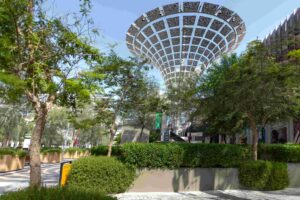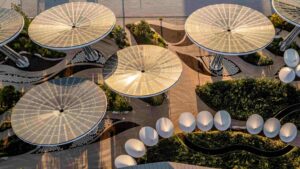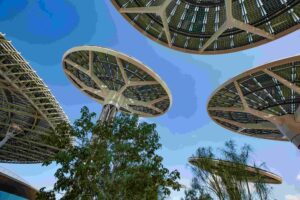Dina Storey, Director of Sustainable Operations, Expo 2020 Dubai discusses the sustainability impact of the global event and the legacy it will leave behind.

Since the very beginning sustainability has been a key value at the heart of Expo 2020 Dubai. Terra, The Sustainability Pavilion, was in fact, the first area to open to the public ahead of the official opening, showcasing not only world developments in the subject but sharing how Expo 2020 itself is showcasing new and proven methods of sustainability throughout its site and all of its platforms. The event’s commitment to sustainability runs much deeper than just on the surface. Sustainability has been in every single part of the process from the very beginning up until today and will continue to stay in place long after the event ends at the end of this month. With a vision of delivering one of the world’s most sustainable World Expos ever, it has been ingrained in every element from buildings and construction, to day-to-day processes and to establishing a lasting legacy in sustainability long after Expo is over.
Dina Storey, Director of Sustainable Operations has been leading the way since the beginning and has been very successful alongside her team, in not only achieving the goals set in place but in sharing them with the world and developing an understanding of sustainability amongst people in the UAE and on a global scale. As the Expo 2020 Dubai site becomes District 2020 later this year, the commitment to sustainability is far from over. Here we discuss with Dina Storey the sustainable legacy that Expo will leave behind and why we are only just getting started.
What impact do you think Expo 2020 Dubai has had on sustainable living in the UAE and also on a global scale?
I think Expo 2020 Dubai has done a lot in terms of the impact it has achieved. For example, look at what has just happened with the announcement of charging for single-use plastic bags in the UAE. This is something we started doing at the Expo site and it was unheard of in the country at the time. We have a very strict way of looking at our packaging and we’ve created our own guidelines in terms of what kind of packaging can be used on site. We created the RISE document which outlines all of these guidelines. Any packaging that comes into Expo goes through that lens which is also applied to everything in our supply chain. Take our uniforms for example we have to consider if they are made ethically and what kinds of dyes are used in them. All of these aspects have been in place since the beginning and now we can see a change happening across not just Dubai, but across the UAE as a whole. The bags that we give in our stores are made of recycled wood shavings and paper and the bags themselves are manufactured in a way that measures their entire lifecycle. Each bag has a QR code that tells the story of how it was made. We can also see a much greater awareness of sustainability on a wider scale today.
Do you think that the UAE government and other governments are looking at the achievements of Expo 2020 and using it as an example to implement some of these initiatives on a wider scale?
I think Expo has created the validation that some of these things can be done. The UAE government has been looking towards this sustainability story for a long time now, but I think it has accelerated over the past year because what we have done at Expo is an example of what can be done in the wider world. Look at composting and how to take care of waste for example. We have a very high waste target of the diversion of 85 per cent of our waste from landfill, which is a lot. And up until the beginning of the event, we were at 91 per cent. The reason for these high numbers is that we monitor exactly what comes into the Expo site and what’s going out. And so we can understand the lifecycle of everything on site which is very important. I think it’s things like this that not just the UAE government, but people in the UAE, are seeing and realising it can be done We’ve even had visitors from Saudi Arabia coming to ask us to go through the entire cycle of what we’ve done operationally. So yes I think it can be rolled out on a bigger scale.

Expo is a controlled environment so you can monitor exactly what’s coming in as you mentioned, so how would this work when these kinds of initiatives are applied on a bigger scale?
Of course, it’s harder to upscale these things. Even though the Expo site is large, it’s still a drop in the water compared with cities, countries, and so on, and at Expo we do have control over what is coming in and going out. But at the same time, that doesn’t mean that it can’t be achieved on a larger scale and that can be achieved firstly by having the correct policies and procedures in place, but also through rewarding entities or people that have done well in following them. Initiatives like charging a small fee for a plastic bag are happening all around the world and this is just the beginning. But if you take that and offer a reward system to those that are doing it successfully, that is something the government is taking into consideration. There is an element of now being able to look at what was done at Expo and know that it can be done elsewhere.
The other element I think is a tailored approach which is something we learnt the hard way. For example, through trial and error, we discovered that not all composters that work in the United Kingdom are suitable for our climate here! Many technologies are coming from abroad which in their own countries will resolve many problems, but we don’t have the same issues here in the UAE. So back to the composters, we vetted many different technologies to make sure we had the right one that works in the right climate with the right requirements to make things happen. And I think it is our duty at Expo to make sure all of this information is inherited in a way that can be very useful for both the public and the private sector in the future. We now know what works and what doesn’t work and that’s the legacy that Expo will leave behind, not just the buildings and District 2020, even though this is stunning, the legacy is also about those trials and errors and those policies and procedures that we put in place and tested at a small level, that can be now expanded beyond the site.
What are some of the highlight processes that you would like to share with us that have been implemented within the Expo 2020 Dubai site?
I could go on and on because I’ve been working on this for almost five years now and so it’s very close to my heart. But it’s not necessarily the big innovations that have made a difference, it’s things such as not using any herbicides or pesticides on-site, which has created a huge influx of different birds, species and insects, and seeing that across the site is amazing. Using native and adaptive species reduces our water intake and that has helped us to reduce our irrigation water by fifty per cent, which is a lot! But it also creates a small bio-diversity space for fauna and flora and that has for us been one of the most beautiful achievements. People ask why the Expo 2020 Dubai site is so green, but we’re not using anything outside of the country and the region, we’re using everything from within the Middle East and that defies many misconceptions about this area. There are around 1,400 palm trees on the site and we are actually in the process of starting the pollination process for that which means the trees will fruit this year. There are around 460 Ghaf trees, the national tree of the UAE, there are millions of shrubs, there are edible plants, wild thyme, you name it it’s there and it’s really beautiful. We never expected the number of different species that we have seen. We have even seen colonies of bees on the site and we have been able to harvest honey from them. It’s amazing.
What is the message you would like to share with people in the UAE and the region concerning sustainability?
It’s the fact that sustainability can be achieved and everyone plays a part. When people first discovered that we didn’t have any single-use plastic bottles for drinking on site they were very surprised and I still remember in some cases, people were truly upset! But now, visitors have adapted and got used to drinking from a can or bringing their own water bottles along with them. People are taking the metro a lot more than we expected, our car parks, even though they are huge, don’t even fill up because many guests prefer to visit by metro than by car. So I think the lesson from the event is that we can do it but we also need to do it together. By making simple changes we can really create a ripple effect.

What can you tell us about the Seeds of Change programme?
The Seeds of Change programme has been years in the making and it’s something I truly love. It is a crowd-solving programme that lets visitors determine which carbon offsets will be purchased by Expo, as they ‘vote’ by donating ‘seeds’. We’ve been measuring our carbon footprint over the past four years and understanding our emissions so we can know and understand our impact on the environment. With the offsetting programme, we wanted to do something that truly had an environmental and social impact and encourage people to get involved.
We have a list of projects which are divided into people and planets in regards to the impact that they have and we just bought offsets in projects in Africa, in South America and Canada. We are hoping to launch a map of all the different projects that we’ve bought offsets in and the idea that the visitors get to vote creates an awareness about these projects which is amazing.
As the event ends in March and the site becomes District 2020, what will happen in terms of sustainability and the projects that are already in place?
Our strategy is going to evolve and is being delivered to the District 2020 team. We have been in touch with them throughout the whole process to make sure that this strategy has longevity. So it doesn’t even when the event ends, it will continue and we will continue measuring our carbon footprint even during the transition towards District 2020. We will also continue our KPI for diverting from landfill. It doesn’t stop when the Expo stops. Beyond Expo, we want to make sure that the monitoring process will continue. That includes the animals, vegetation and so on as well. The irrigation system will stay in place. What will change is just the faces of who’s taking care of it.
In your opinion what is your biggest achievement throughout the event so far?
On a personal level, the biggest achievement is when we opened our doors and we had kids coming in and they were in awe. My niece has never been happier than she is at Expo! She loves to be more sustainable and it’s really brought awareness and understanding to children. So I think the biggest impact for me is how I see the impact Expo has on visitors, especially children. Children are more aware than some of the grownups and it is educating them on the future and I think that’s really great.

Is there anything you would still like to implement that you haven’t done yet or anything you would like to see happen in the future?
Personally, I would like to see the sustainability journey continue. If we’re using Seeds of Change to offset, I want that to be expanded so that anyone coming to the UAE can actually vote or have a say in how they offset their carbon footprint. I would love to see some of the programmes that we have already continue to evolve. Our recycling programmes are great, and our RISE document is the basis for a UAE green label. I want to see that become a UAE Green Label so that we can have products that meet certain requirements and you can have the guarantee that they are sustainable. I would like to see more transparency in the supply chain, be it utilising the RISE document or another method and I would like to see the story go on and on and expand further and further.















